2021-2022 年浙江宁波高一英语上学期期末试卷及答案
B. Paris.
第一部分听力(共两节,满分 30 分)
第一节(共 5 小题;每小题 1. 5 分,满分 7. 5 分)
听下面 5 段对话。每段对话后有一个小题,从题中所给的 A、B、C 三个选项中选出最佳选
项,并标在试卷的相应位置。听完每段对话后,你都有 10 秒钟的时间来回答有关小题和阅
读下一小题。每段对话仅读一遍。
1. Where does the man come from?
A. Sydney.
2. What is the woman doing?
A. Checking her e-mail.
B. Looking for an Internet cafe.
C. Looking around the university.
3. What are the speakers talking about?
A. The man's hobby.
B. The man's co-workers.
C. The man's new job.
C. London.
4. When will the man meet Mr. Smith?
B. At 2:15.
C. At 3:30.
A. At 2:00.
5. How will the speakers deal with the old toys?
A. By giving them away.
B. By keeping them.
C. By throwing them out.
第二节(共 15 小题;每小题 1. 5 分,满分 22. 5 分)
听下面 5 段对话或独白。每段对话或独白后柯几个小题,从题中所绐的 A、B、C 三个选项
中选出最佳选项,并标在试卷的相应位置。听每段对话或独由前,你将有时间阅读各个小
题,每小题 5 秒钟:听完后, 各小题将给出 5 秒钟的作答时间。每段对话或独白读两遍。
听下面一段对话,回答第 6 和第 7 两个小题。
6. Why does the man want to learn Chinese?
A. His boss asked him to learn it.
B. He will have a vacation in China.
C. He wants to meet the needs of his job.
7. What does the woman suggest the man do?
A. Sign up soon.
B. Talk with the customer.
C. Begin his class.
听下面一段对话, 回答第 8 和 9 题。
8. What is the man doing?
A. Preparing for a conference.
B. Eating in a restaurant.
C. Having a meeting.
9. What does the man order in the end?
�
C. In a hall.
B. In a library.
A. Vegetable salads.
B. Chicken salads.
C. Fruit salads.
听下面一段对话, 回答第 10 至 12 题。
10. What is the man's problem?
A. His paper was on an incorrect topic.
B. He is going to get a zero on his report.
C. He can't hand in a report until next month.
11. Where did the man get the task?
A. From the topic list.
B. From his friend.
C. From the woman.
12. Where does the conversation most probably take place?
A. In an office.
听下面一籹对话, 回答第 13 至 16 题。
13. Why hasn't the woman been to the farmers' market?
A. She thought it expensive.
B. She lives near the local supermarket.
C. She didn't hear of the opening of the market.
14. Why does the man mention a blog about the market?
A. To tell the location of the market.
B. To introduce the variety of its goods.
C. To show the advantages of its goods.
15. What saves people most money in the market?
A. Milk.
16. What will the woman do next?
A. Go and find the blog.
B. Go to the market with the man.
C. Go shopping in the supermarket.
听下面一段独白, 回答第 17 至 20 题。
17. How often should the competitors cycle a week?
A. Five times.
18. When is the match to be held?
A. In six weeks.
19. What should the listeners do during the training?
A. Do all the training on their own.
B. Have a regular medical examination.
C. Try to keep their body in good condition.
20. What is a must for students taking part in the match?
A. A strong build.
B. Their parents' permission.
C. Good examination marks.
第二部分阅读理解(共两节,满分 35 分)
第一节(共 10 小题;每小题 2. 5 分,满分 25 分)
C. Fruit and vegetables.
B. In four weeks.
C. In two weeks.
B. Yogurt.
B. Four times.
C. Three times.
�
阅读下列短文,从题中所给的 A、B、C 和 D 四个选项中,选出锻佳选项,并在答题纸上将
该选项涂黑。
A
The Chinese version of the French book, Pourquoi les Chinois ont-ils le temps
(Why Chinese People have Time), has been recently published by SDX Joint Publication
Co. The author, Christine Cayol, who has lived in China for more than 20 years, shares
her observations in her writing on Chinese wisdom towards "time".
In the western world, the concept of time is often measurable, which can date
from the Industrial Revolution. This view of time always reminds people of progress,
improvement and efficiency.
Unlike the western "race mode", the Chinese view of time is more like a "flowing
water mode". In Cayol's eyes, Chinese people can become friends with time. "For the
Chinese, time is neither a flying arrow at the target nor an hourglass measuring
quicksand, but running water," she said. "Water can devour us, but it carries us
and holds us as well; it seems weak, but is strong actually, and nothing can stop
it from flowing into the sea."
Cayol used to be uncomfortable with the way Chinese dealt with time when she
first came to China: They never make appointments, and always change the time for
a meeting. However, as she became more familiar with Chinese culture, Chinese wisdom
has been gradually understood by her.
Life in China led Cayol to experience a different view of time, which invites
people to listen to their heart, to think and to love. Time in China seems to be
internal, beneficial and cherished. It is life itself: It can be solid and liquid,
fast and slow, hard and soft at the same time.
Now, Cayol likes spending five hours with friends making dumplings or noodles.
She believes it's a way to get along with each other, and no one will measure the
time it takes. "I'm not introducing a method; I just want to reveal a new view of
time, which is completely different from that in the West. Adopting it will be just
like using a foreign language - it gives us greater freedom in the modern world,"
Cayol said. She hopes that Pourquoi les Chinois ont-ils le temps can be a cure for
Westerners' worried hearts.
1. The western view of time can have the following features EXCEPT ________.
B. the flowing water mode
A. the mode of race
C. the focus on efficiency
D. the focus on progress
2. The underlined word "devour" in Paragraph 3 probably means ________.
A. help
D.
destroy
3. According to the passage, which of the following statements is true?
A. The Chinese tend to feel worried about time.
B. Cayol studied people's different attitudes towards time in China.
C. On arriving in China, Cayol admired the way Chinese dealt with time.
D. How the Chinese treat time is closely related to the Chinese culture and wisdom.
4. What type of writing is the passage?
A. A travel journal.
B. An introduction to a book.
B. shelter
C. track
�
C. A summary of a book.
【答案】1. B
2. D
3. D
4. B
B
D. An advertisement for a book.
Too many deaths and injuries occur while mobile phones are being held. Tougher
new laws will come into force in a further severe action on using a mobile phone
behind the wheel from next year.
It is already illegal to text or make a phone call, other than in an emergency,
using a hand-held device while driving. From 2022, laws will go further to ban drivers
from using their phones to take photos or videos, or play games. This will mean anyone
caught using their hand-held device while driving will face a £200 fixed penalty
notice and six points on their license. Drivers will still be able to continue using
a device “hands-free” while driving, if it’s secured in a cradle (支架).
The government will also revise The Highway Code to explain the new measures.
It will also be more precise about some facts, making it clear that hand-held mobile
phone use at traffic lights or in motorway jams is illegal except in very limited
circumstances.
There will be an exemption (豁免) to the new law for drivers making a contactless
payment using their mobile phone. This will cover, for example, places like a
drive-through restaurant or a road toll, and will only apply when payment is being
made with a card reader. Anyway, it will not allow drivers to make general online
payments while driving.
Mary Williams, chief executive of Brake — the road safety charity, said, “If
drivers take their attention away from driving, this can be deadly. Using a hand-held
phone at the wheel is never worth the risk. This important road safety decision by
government, along with Road Safety Week, is very welcomed. The theme for Road Safety
Week is road safety heroes — we can all be road safety heroes by giving driving
our full attention.”
5. The purpose of the passage is mainly to ________.
A. present some new findings about using a mobile phone behind the wheel
B. describe the relationship between road safety and driving with full attention
C. report new problems caused by drivers who use mobile phones while driving
D. introduce new laws that will go further to ban drivers from using mobile phones
6. Which of the following statements is true according to the new law?
A. Hand-held mobile phone use at traffic lights is always illegal.
B. Those using their hand-held devices while driving will be fined.
C. Younger drivers are more likely to use hand-held devices at the wheel.
D. Using phones to take photos or videos while driving will not be allowed.
7. What is Mary Williams’s attitude towards the government’s new road safety
decision?
A. Positive.
Objective.
【答案】5. D
C. Uninterested.
B. Negative.
D.
6. D
7. A
When learning a foreign language, most people use traditional methods: reading,
C
�
writing, listening and repeating. But people can also remember the vocabulary better
by making gestures while studying. Linking a word to brain areas that are responsible
for movement can strengthen the memory of its meaning. "Our results provide evidence
for why learning techniques”, Mathias said.
As Mathias and his colleagues described, they had 22 adults learn a total of
90 invented artificial words over four days. While these adults first heard the new
vocabulary, they were shown a video of a person making a gesture that matched the
meaning of the word. When the word was repeated, they performed the gesture
themselves. Five months later, they were asked to translate the vocabulary they had
learned in a multiple-choice test. The researchers found that the motor cortex
contributed to the translation of the vocabulary learned with gestures. This applied
to concrete words, such as "camera," as well as abstract ones, such as "thought."
“There have been quite a lot of studies showing that gestures play a role in
learning. I think this study takes a step further as it is trying to understand why,"
says Susan Goldin-Meadow, a psychologist at the University of Chicago who studies
the effects of gestures on learning. Research like this, as well as brain imaging,
suggests the activation of the brain's motor areas could contribute.
B. Techniques of remembering
Children — unlike adults — seem to benefit from pictures as much as gestures
in the long run. In an experiment published in 2020, the Leipzig research group had
young adults and eight-year-old children listen to new vocabulary for five days,
sometimes paired with matching pictures or videos of gestures. After two months,
the two methods were still tied. But after six months, the adults benefited more
from the gestures than the pictures, while the children were helped equally by both.
8. What is the focus of Mathias and his colleagues' new study?
A. Functions of motor cortex.
vocabulary.
C. Reasons for the gestures' influence on learning. D. Methods of learning a
foreign language.
9. In the last paragraph, an experiment is mentioned to show
A. pictures were used in the Leipzig research
B. pictures are as helpful as gestures to adults
C. pictures and gestures may be both helpful to children
D. pictures should be used more often than gestures in learning
10. Which of the following might be the best title for the text?
A. How Children Learn New Words
C. How People Learn Foreign Languages
Words
【答案】8. C
第二节(共 5 小题;每小题 2 分,满分 10 分)
根据短文内容,从短文后的选项中选出能填入空白处的最佳选项。选项中有两项为多余选
项。
B. How Brain Works More Effectively
D. How Gestures Help You Learn New
.
9. C
10. D
Getting to work on time might not sound like a big deal but is a bigger one than
you think it is. If you keep getting to work late, you might end up getting fired
�
sooner than you thought. However, if you set a proper schedule and follow some tips,
it wouldn't be an issue. ____11____
Try to get to bed early. Then you will have more hours of sleep and you will
be able to get up easily in the morning. ____12____ Keep your mobile phone or clock
away from you since you can turn it over if it is close to you. Leave it somewhere
where it is not in your reach and to turn it off, you will have to wake up.
Make a to-do list the night before. ____13____ There are many advantages of
making a to-do list the night before, as before sleep, you may have all sorts of
thoughts running through your head about what you have to do the next morning. To-do
lists can help save you the trouble of making an imaginary list inside your head,
and thus you can have a sound sleep.
Have your coffee ready in the morning. If one thing that can get you going in
the morning is a cup of coffee, you need to set your coffeemaker in the night to
have the coffee ready when you wake up. ____14____ Anyway, it would be hard to do
all the little chores before leaving for work.
Avoiding rush hour is the best thing that you can do to get to work on time.
For most people, work starts at 9 in the morning and an hour before this time can
be a rush hour where there are terrible traffic jams and slow public transport that
can make you get late to work. ____15____ You will get to work on time and also save
yourself from being frustrated.
A. Also, set your alarm before sleeping.
B. So leave a bit earlier and avoid the rush hour.
C. That will be helpful and make you super active.
D. This is one of the most productive things that you can do.
E. Let's share some tips that can help you get to work on time.
F. You can read a book and it will definitely help you get to sleep.
G. Then you will be able to sleep better and it is easier to get up early.
【答案】11. E
第三部分语言运用(共两节,满分 45 分)
第一节完形填空(共 20 小题;每小题 1.5 分,满分 30 分)
阅读下面短文,从短文后各题所给的 A、B、C 和 D 四个选项中,选出可以填人空白处的最
佳选项,并在答题纸上将该项涂黑。
14. C
15. B
12. A
13. D
When I was a kid, I was the girl who kept the training wheels on my bike as long
as possible. Even my younger sister had ____16____ them much earlier than me. But
as I began to grow older, this changed.
All this happened on that unforgettable day. Actually, it was supposed to be
a ____17____ day at school when all of us kids brought our bikes to school and the
school ____18____ us with the opportunity to ride outside. Sounds like fun, right?
No. In fact, it caused me to feel ____19____. What was I going to say ____20____
my friends asked me about my training wheels?
With the pressure of everyone seeing my training wheels, I ____21____ to let
them go. This was the first big change I'd ever ____22____ on my own.
I went to my parents and told them all about my ____23____. They were ____24____
happy to help. We went outside and got my bike. ____25____ running away and hiding
�
behind, I stood in front of my bike and took great pride in my decision as my dad
____26____ the training wheels.
B. fun
C. ridiculous
D.
D.
D.
D.
D.
B. observed
C. followed
B. frightened
C. amazed
B. instructed
C. offered
C. got through
D. got rid
B. got along with
B. after
B. used
D. until
D.
C. when
C. tended
I got on and ____27____ myself. My feet and hands were calm although my heart
____28____. my dad started to ____29____ before my feet even moved and suddenly I
was off. The fear ____30____ and a relaxed mind came into its place. It was crazy
to think how quickly I learned ____31____ that took so long for me to even try!
My ____32____ increased. This was going to be the ____33____ of a brand new world
for me. My achievement would carry me ____34____ to new goals and wins. I realized
that if I ____35____ my mind to something, I could achieve it.
16. A. got over
of
17. A. fearless
various
18. A. provided
preferred
19. A. excited
relaxed
20. A. before
21. A. hesitated
determined
22. A. made
received
23. A. shame
disappointment
24. A. more than
than
25. A. In spite of
with
26. A. restored
arranged
27. A. sheltered
28. A. raced
29. A. pull
30. A. crowded in
brought up
31. A. everything
nothing
32. A. anxiety
confidence
33. A. attraction
34. A. forth
35. A. seek
【答案】16. D
A
C. took
C. beat
C. handle
C. faded away
C. start
C. out
C. reward
21. D
30. C
B. balanced
B. froze
B. drag
B. built up
D. slid
D. sank
D. push
D.
B. appeal
B. away
B. forbid
D. sight
D. off
D. set
25. B
26. C
27. B
28. A
29. D
B. embarrassment
17. B
18. A
19. B
20. C
22. A
31. B
23. C
32. D
C. rather than
D. less
C. frustration
B. Instead of
C. Apart from
D. Along
B. something
C. anything
C. removed
D.
B. failure
C. decision
B. other than
B. took
D.
D.
24.
33.
�
35. D
34. A
C
第三部分语言运用(共两节,满分 45 分)
第二节(共 10 小题;每小题 1. 5 分, 满分 15 分)
阅读下面材料,在空白处填人适当的内容(1 个单词)或括号内单词的正确形式。
Many factors have made China’s ancient civilization continue all the way through
into modern times, one of ____36____ has been the Chinese writing system.
Several thousand years ago, the Chinese language ____37____ (base) on pictures.
People in ancient times carved symbols on animal bones and shells. ____38____ was
not until the Shang Dynasty that the symbols developed into a fairly good writing
system. Over the years that followed, people lived apart from each other
geographically, ____39____(contribute) to a wide variety of dialects and characters.
Therefore, the system developed into different forms. However, Emperor Qinshihuang,
who united the seven states into one country, demanded that the writing system
____40____(unify). It was really an important move ____41____ that meant people
could communicate with each other wherever they lived. Besides, thanks to it, people
in modern times can read classic works ____42____ (write) in Chinese.
The Chinese have a high regard ____43____ the writing system, which serves as
39. contributing
a great way to connect China’s present with its past. As China is playing an
____44____ (increase) important role in the world at present, many foreign students
are learning this amazing language for the ______45______ (appreciate) of its
culture.
【答案】36. which
37. was based
38. It
40. be unified##should be unified
41. because##as##since
42. written
43. for
45. appreciation
第四部分写作(共两节,满分 40 分)
第一节应用文写作(满分 15 分)
46. 假如你是李华, 校英文报的记者。你校上周日晩上为来自美国的 20 个交换生举行了欢
迎仪式 (welcoming ceremony)。请给校英文报写一则报道, 内容包括:
1. 时间、地点;
2. 内容: 校长致辞、学生展示书法绘画才艺、歌舞晩会;
3. 活动意义。
注意:
1. 词数 80 左右, 报道标题与记者姓名已给出, 不计入词数;
2. 可以适当增加细节, 以使行文连贯。
44. increasingly
An Impressive Welcoming Ceremony
_______________________________________________________________________________
_______________________________________________________________________________
_______________________________________________________________________________
�
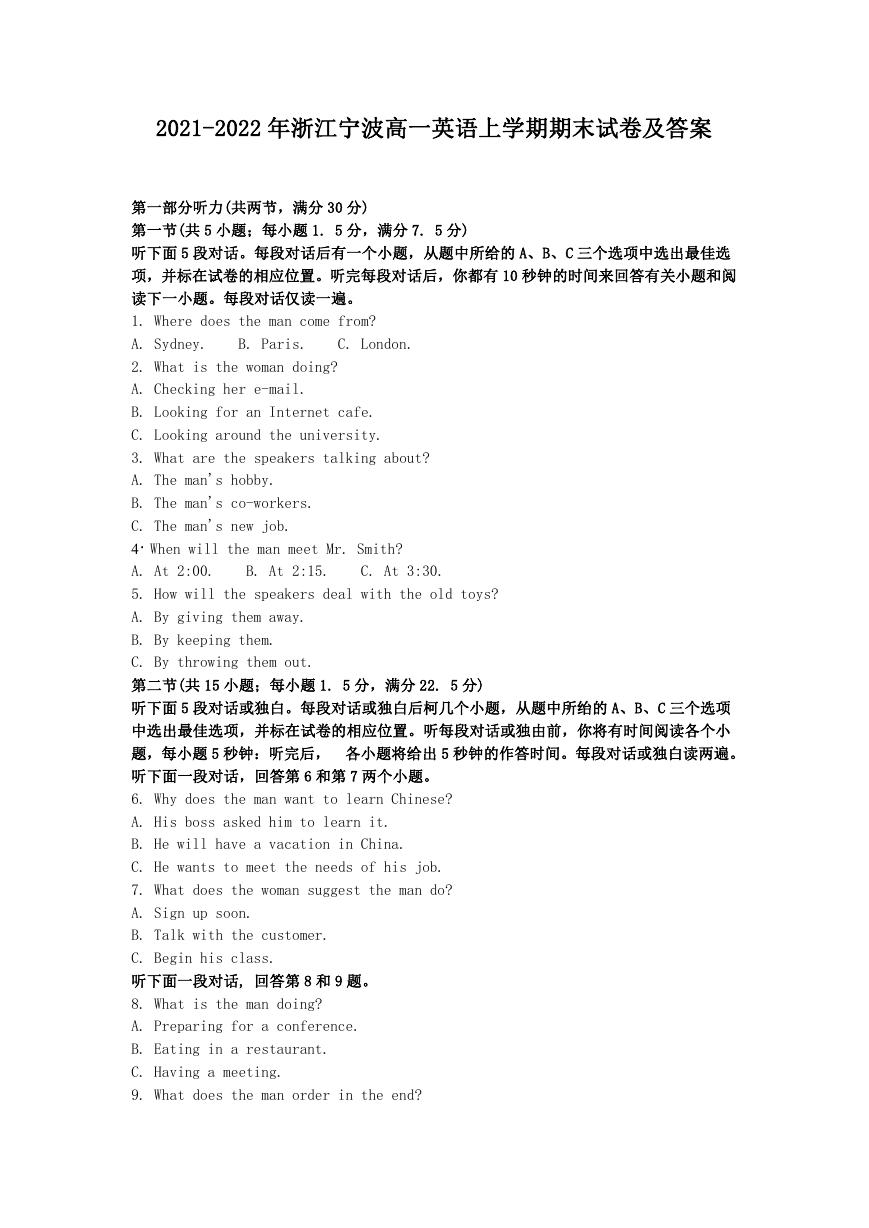
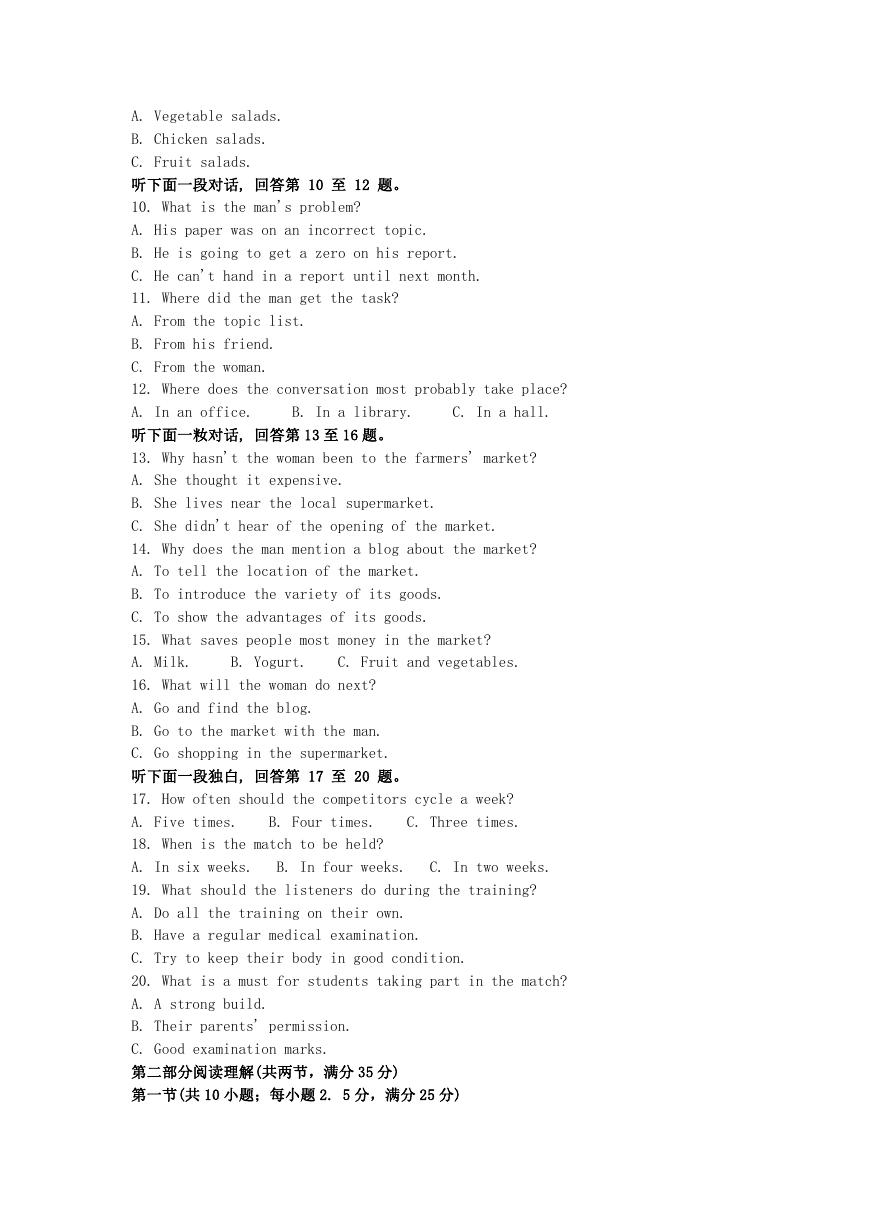
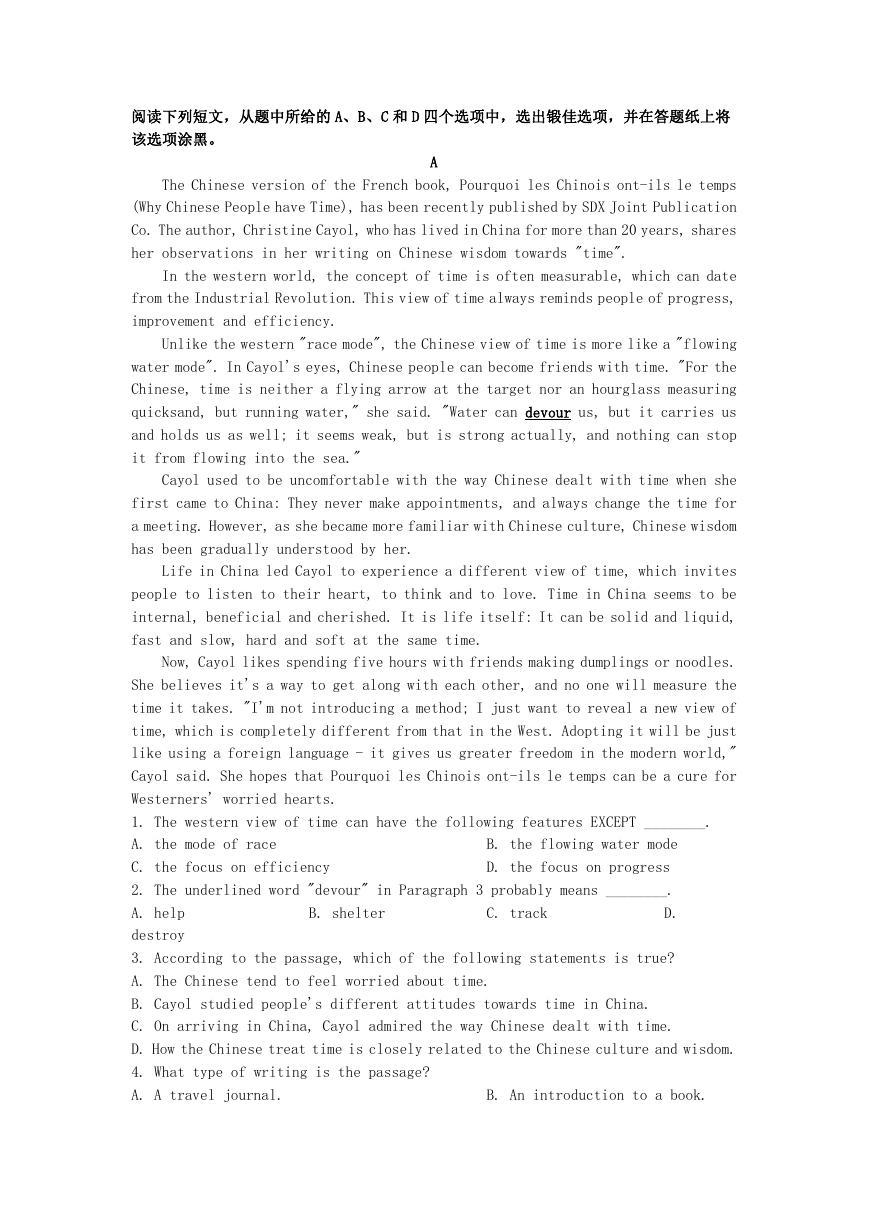
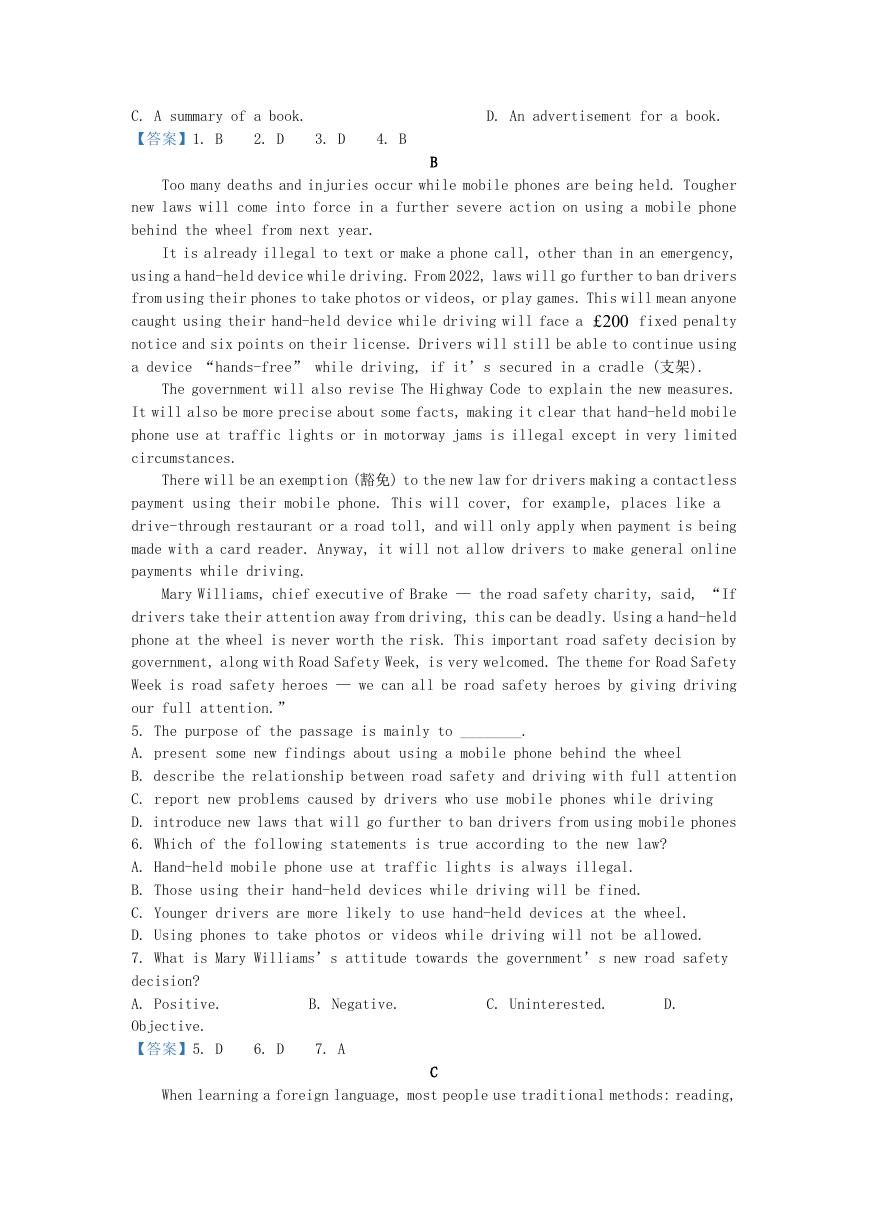
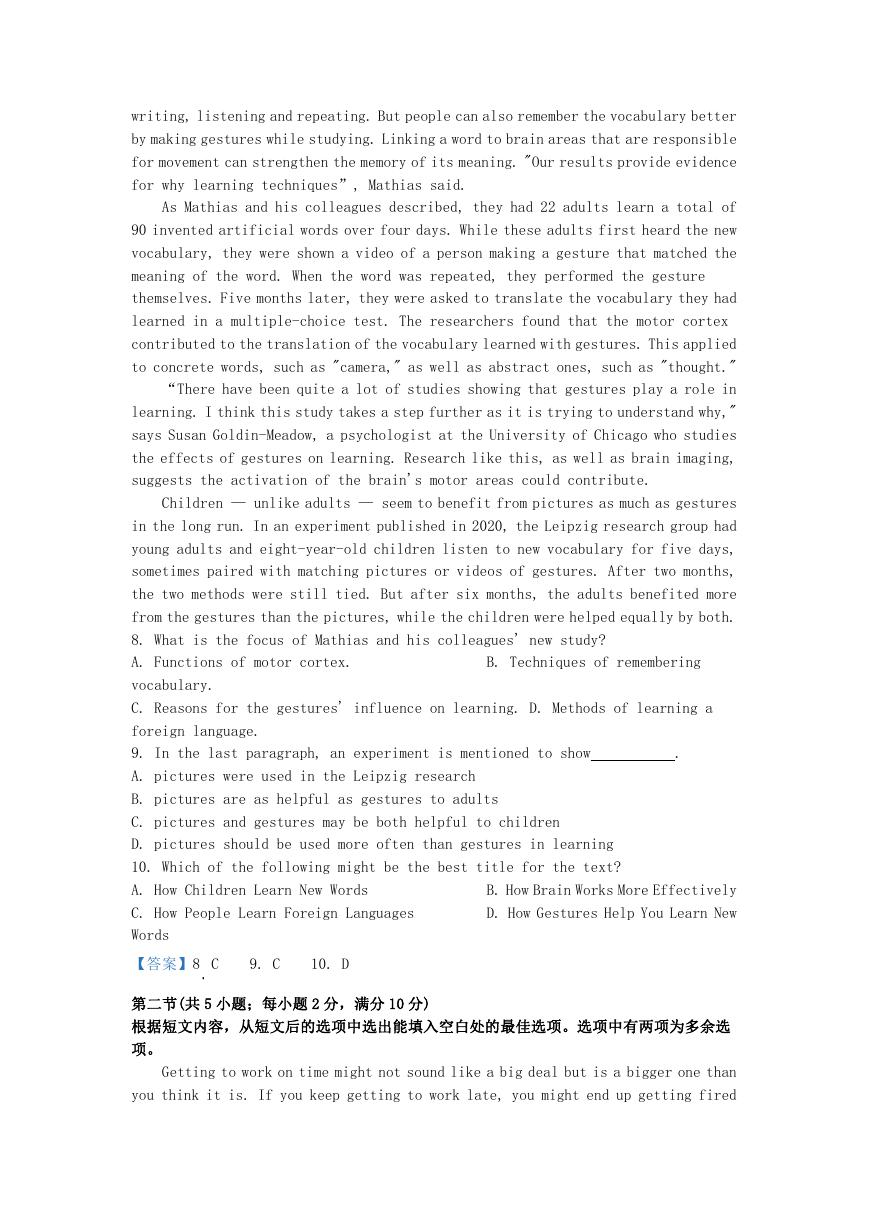
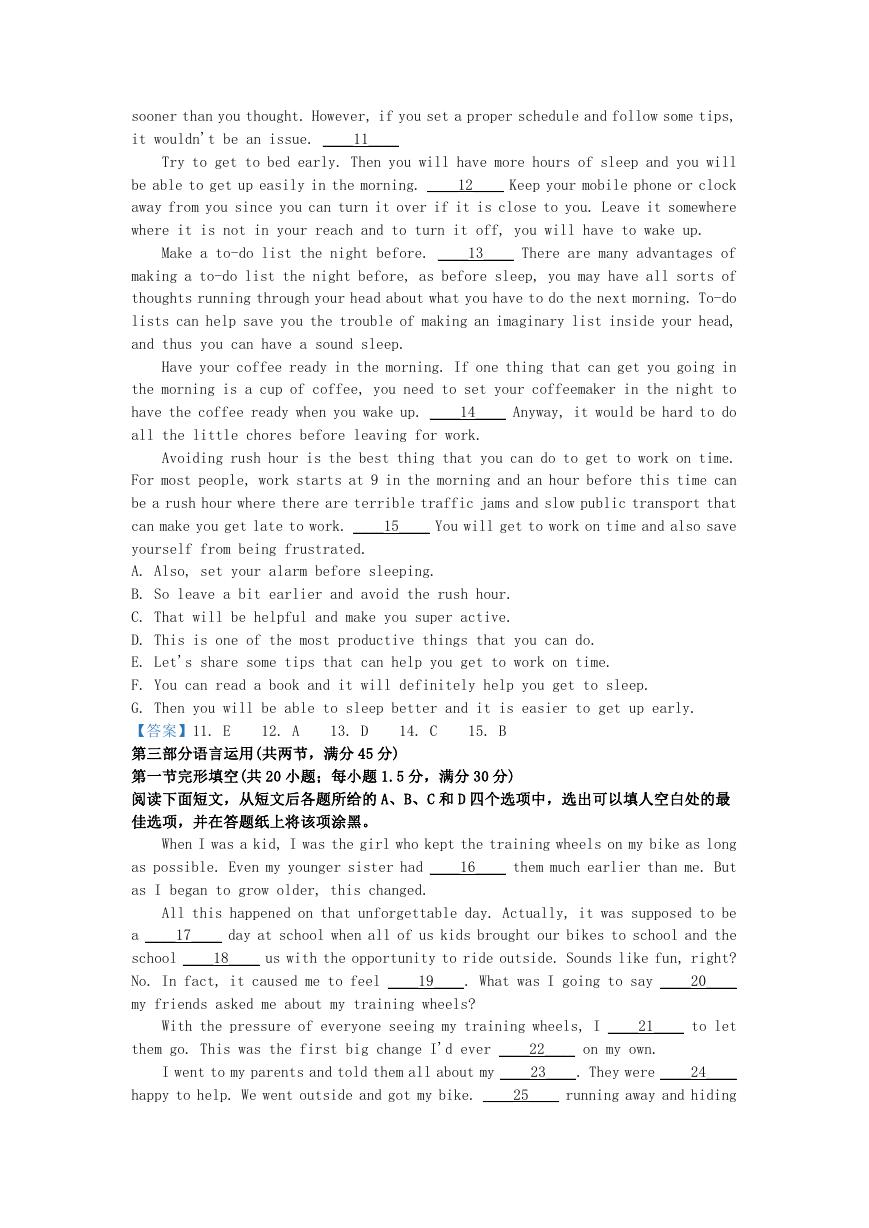
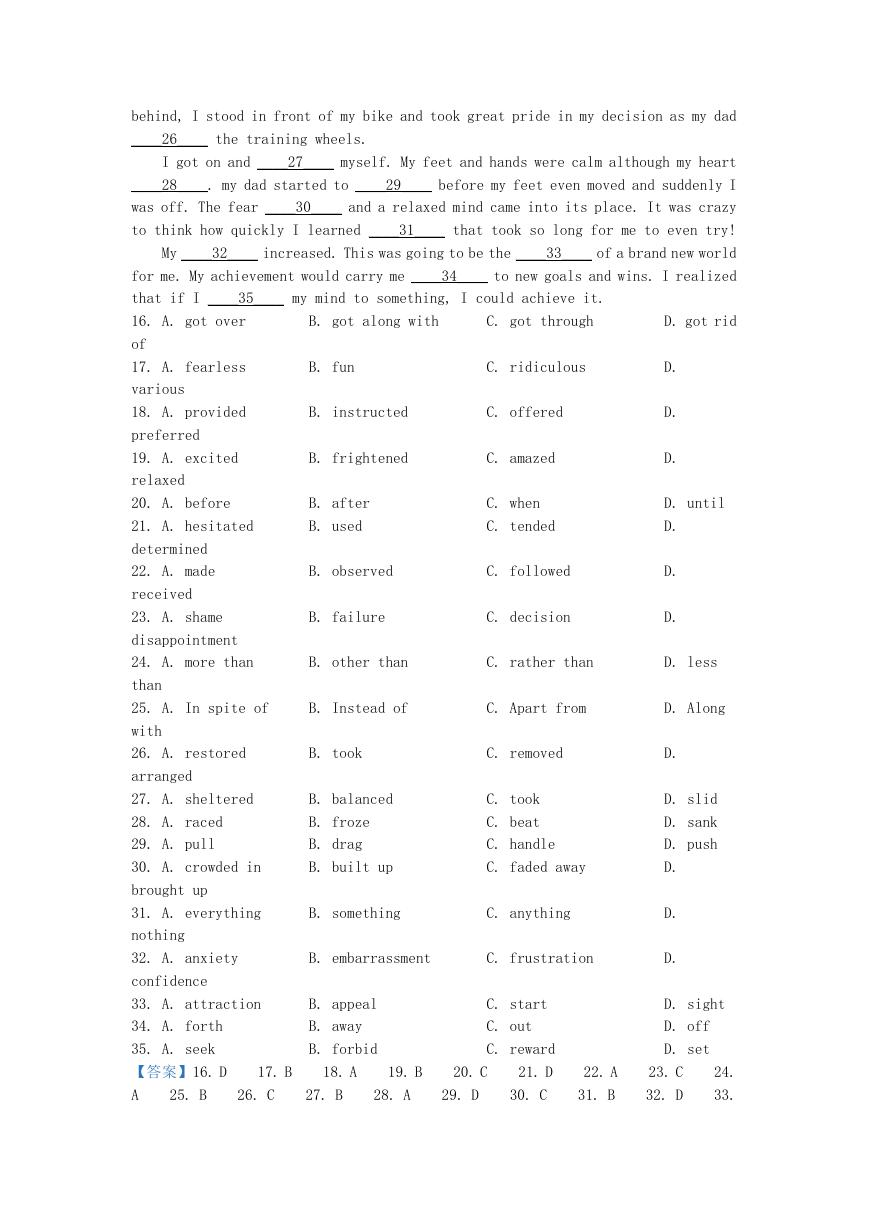
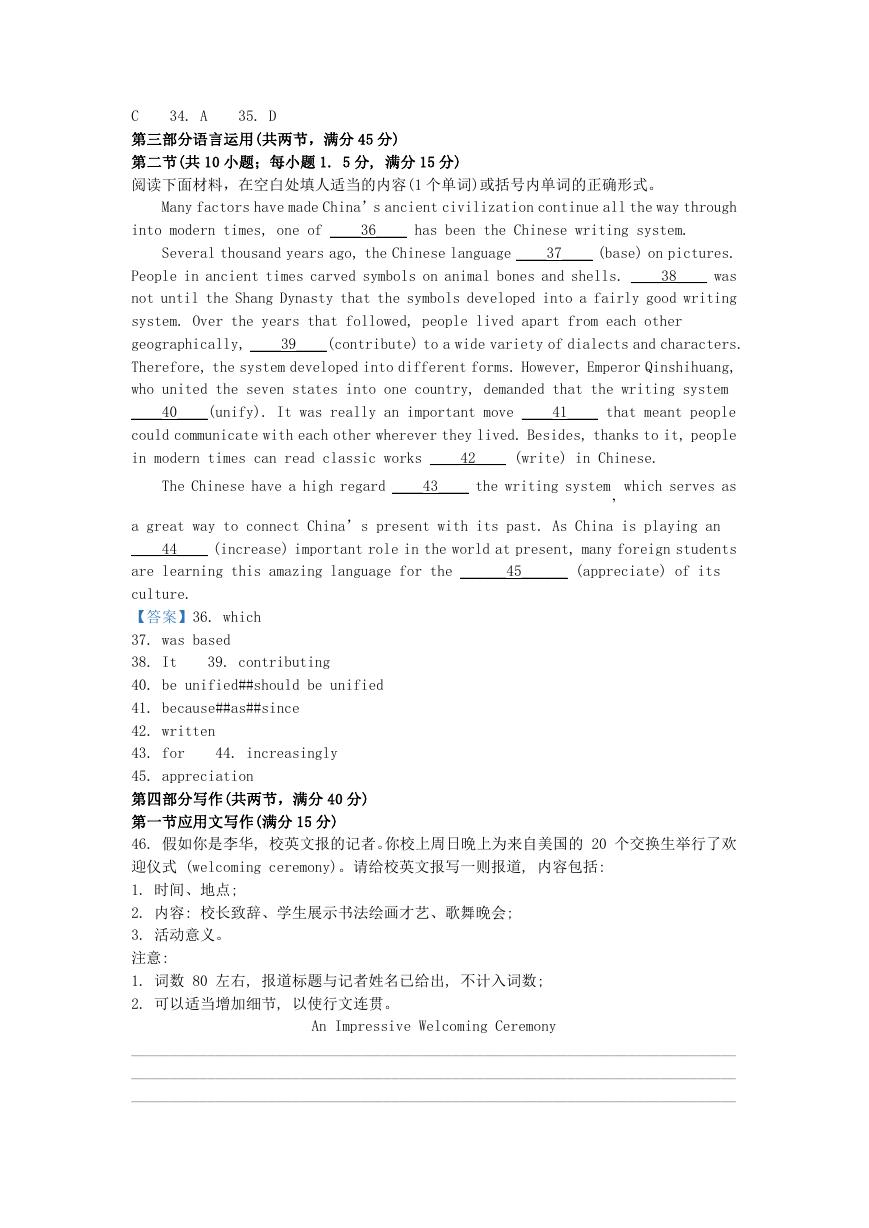








 2023年江西萍乡中考道德与法治真题及答案.doc
2023年江西萍乡中考道德与法治真题及答案.doc 2012年重庆南川中考生物真题及答案.doc
2012年重庆南川中考生物真题及答案.doc 2013年江西师范大学地理学综合及文艺理论基础考研真题.doc
2013年江西师范大学地理学综合及文艺理论基础考研真题.doc 2020年四川甘孜小升初语文真题及答案I卷.doc
2020年四川甘孜小升初语文真题及答案I卷.doc 2020年注册岩土工程师专业基础考试真题及答案.doc
2020年注册岩土工程师专业基础考试真题及答案.doc 2023-2024学年福建省厦门市九年级上学期数学月考试题及答案.doc
2023-2024学年福建省厦门市九年级上学期数学月考试题及答案.doc 2021-2022学年辽宁省沈阳市大东区九年级上学期语文期末试题及答案.doc
2021-2022学年辽宁省沈阳市大东区九年级上学期语文期末试题及答案.doc 2022-2023学年北京东城区初三第一学期物理期末试卷及答案.doc
2022-2023学年北京东城区初三第一学期物理期末试卷及答案.doc 2018上半年江西教师资格初中地理学科知识与教学能力真题及答案.doc
2018上半年江西教师资格初中地理学科知识与教学能力真题及答案.doc 2012年河北国家公务员申论考试真题及答案-省级.doc
2012年河北国家公务员申论考试真题及答案-省级.doc 2020-2021学年江苏省扬州市江都区邵樊片九年级上学期数学第一次质量检测试题及答案.doc
2020-2021学年江苏省扬州市江都区邵樊片九年级上学期数学第一次质量检测试题及答案.doc 2022下半年黑龙江教师资格证中学综合素质真题及答案.doc
2022下半年黑龙江教师资格证中学综合素质真题及答案.doc